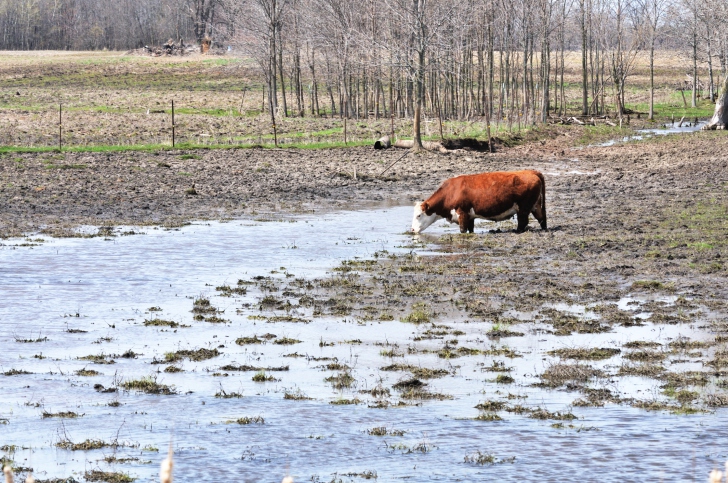
Biden EPA’s Waters of the United States Rule Limits Private Property Rights
The U.S. Environmental Protection Agency (EPA) recently revised the definition of “Waters of the United States” (WOTUS) to clarify what kinds of bodies of water can be regulated under the 1972 Clean Water Act.
The updated rules are similar to the broader definitions passed by the Obama administration’s EPA in 2015, which were blocked by courts, and were replaced by new rules under the Trump administration.
The EPA’s Agricultural Community Fact Sheet list a number of exclusions from the WOTUS definition of federally regulable waters. The list includes: ditches which are draining “only dry land,” and don’t have permanent water; irrigated areas that would be dry land if the irrigation was stopped; artificial lakes and ponds that are used as stock ponds, rice growing, irrigation, or settling basins; artificial reflecting or swimming pools; “waterfilled depressions” dug out in dry land like those dug during construction activities, “unless and until” the construction project is ended and the body of water remains; and swales and other features like gullies or small washes that only hold a small amount of water, or only hold water intermittently.
Harassing Farmers Over Puddles
These exclusions, including the ones directed toward property owners, are insufficiently protective of property rights, and still leave the federal government with too much power and discretion over private and state waters and lands, said Rep. Doug LaMalfa (R-CA), in a press release concerning the WOTUS rules.
“Rural America doesn’t need yet another rule giving the federal government more power over farming and private property,” LaMalfa said. “The federal government shouldn’t have jurisdiction to regulate puddles, ditches, seasonal creeks or culverts.”
LaMalfa compared the new rules to the 2015 rule passed under the Obama administration, which LaMalfa says allowed the EPA to harass and fine farmers for not getting tedious and time-consuming permits from the government to do what used to be routine farm work.
“This 2015 rule was nothing short of a land and water grab that gave bureaucrats the ability to meddle in intermittent and ephemeral streams—such as the kind used for drainage and irrigation—to harass farmers for plowing fields they historically grew crops on,” LaMalfa said. “Under this rule, the EPA could fine farmers thousands of dollars if they simply rotated from one crop to another on their own land without first gaining permission that could take years to receive from Washington bureaucrats.”
‘Common Sense Conservation’
Farmers themselves are the best stewards of the land they live on and work, not federal regulators thousands of miles away, U.S. Rep. Ron Estes (R-KS) said in a press release responding to EPA’s revised CWA regulation.
“Kansas farmers and ranchers are the best stewards of their land, but the final WOTUS rule hands over private property decisions to Washington bureaucrats,” Estes said. “As a Kansan and former farm kid, my colleagues and I will continue pushing back against this burdensome administration that chooses to govern with a heavy hand and disregards the common-sense conservation by the men and women who actually work the land.”
EPA Power Grab
Since the inception of the Clean Water Act (CWA), the EPA has attempted to expand its authority under the act, attempts that have been rebuffed legally in the courts, says H. Sterling Burnett, Ph.D., director of the Arthur B. Robinson Center on Climate and Environmental Policy at The Heartland Institute.
“Courts, including the U.S. Supreme Court, have repeatedly ruled in ways that limited EPA’s CWA authority over non-navigable, ephemeral waters, only to have the EPA come back with creative language in a new rule that kept or even expanded the authority the agency acceded to itself to control non-navigable waters and thus private and state lands,” Burnett said. “Biden’s rule is not as bad as Obama’s but it is basically what the courts have already said previously was illegal.”
The Biden administration’s new water regulations create uncertainty for landowners and offer the regulators the power to act capriciously as they see fit, says Burnett.
“Biden is basically going back to the bad old days of the way things used to be, with the federal Sword of Damocles hanging precariously above every farmer, rancher, and developer’s head, leaving them uncertain whether they can manage their land as they wish and, if they need a federal permit, how much authority or resources they will have to cede to the federal government in order to exercise their rights to manage and develop their property,” Burnett said.
Imaginary Nexus
Federalism under the Constitution should act as a check on the federal government’s authority under the act to regulate most waters in the nation, says Burnett.
“CWA protections cover all ‘federal waters,’ and state waters that cross borders, under the interstate commerce clause,” Burnett said. “No water, wetland, soggy field, etc., whether navigable or not, should fall under federal jurisdiction unless it crosses state lines or directly, not through some imaginary, unseen and unmeasured ‘nexus,’ connects to surface waters that impact waters in other states.
“Under constitutional federalism, states and private landowners alone should have sole control over the waters on their lands,” Burnett said. “The CWA should simply not apply.”
For more on the Clean Water Act and WOTUS, click here.
For more on wetlands, click here.
IT’S BACK: The Heartland Institute’s Next CAN’T MISS Climate Conference
Linnea Luekenhttps://www.heartland.org/about-us/who-we-are/linnea-lueken
Linnea Lueken is a Research Fellow with the Arthur B. Robinson Center on Climate and Environmental Policy. While she was an intern with The Heartland Institute in 2018, she co-authored a policy brief ‘Debunking Four Persistent Myths About Hydraulic Fracturing’.
